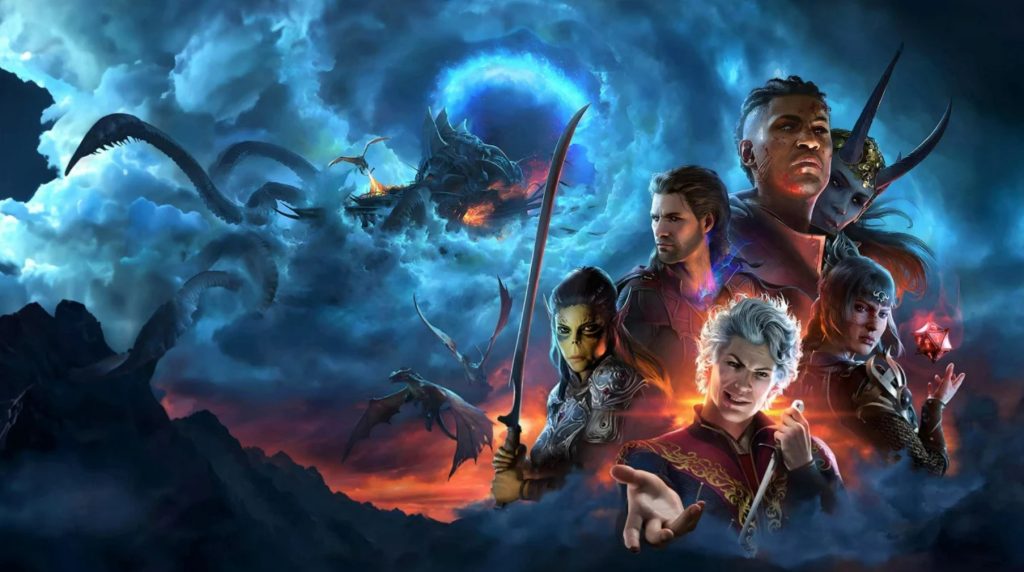
Yesterday, GameDaily reported a recent presentation from Circana on the industry’s “new normal,” in which overall steady growth patterns are being driven by new console uptake and blockbuster releases, while macro economic and demographic factors act broadly as negative influences.
This is a useful and cogent summary of broad, post-pandemic trends, that we see being played out at a micro-level through the daily ebb and flow of gaming events, ranging from massively successful game launches and enduring popular perennial hits, through to endless rounds of game worker lay-offs, studio closures, labor conflicts, game company blunders, and culture war spats.
This summer, we’ve been treated to three giant masterpiece releases in the form of The Legend of Zelda: Tears of the Kingdom, Baldur’s Gate 3, and Starfield. All are story-intensive role-playing games featuring myriad characters and large, explorable worlds. They have all been warmly received (on the whole) by critics; have proven commercially successful, and have brought credit to the skills and imaginations of their respective studios.
They also show – in their different ways – that there are many ways to create excitement and energy in the market, through bold game design, smart marketing, and intelligent planning, not to mention confident investment.
All of these games are highly complex and expensive endeavors that reflect the cultural mores of their creators. Nintendo’s commitment to innovation, its attention to detail and its commitment to “polish”. Larian’s ferocious tenacity in delivering a game that reflects the specific vision of its makers. Bethesda’s long-established ability to create vast fantasy playgrounds that satisfy players’ need to escape to fantastical worlds.
Mountains move
Such games move mountains. Zelda’s release triggered a surge in sales for the Nintendo Switch, while Xbox Series sales have leaped up during the run-up to Starfield’s launch. Baldur’s Gate 3 drove massive user growth on Steam in the first weeks of its launch.
At the same time, game companies are too often prone to short-termism, and the calculations of C-Suite mandarins, who demonstrate a callous attitude to the people who make the games that drive long-term growth and consumer satisfaction.
Last week, Embracer Group “made the difficult decision” to shut down Volition, a studio that has been in existence for 30 years, after executives “evaluated strategic and operational goals”. Volition’s contributions over the years include such admirable games as Saints Row, and Red Faction, as well as also-rans like Agents of Mayhem.
Few studios manage to get through three decades without delivering hit games, nor the odd duffer. Volition had managed to ride out a series of acquisitions and publisher mayhem, including THQ and Koch Media. Now, it’s gone, along with the jobs of hundreds of employees. Reports are also circulating that Embracer has ordered more layoffs at another of its offshoots, Gearbox.
Incredible pressure
In gaming, lay-offs and closures are a depressingly regular occurrences. In the last month, we also saw the closure of Minimi Games, which called time after the release of Shadow Gambit: The Cursed Crew. The company’s co-founders gestured towards the incredible pressures faced by developers, writing: “After the release of Shadow Gambit we decided it was the right time to prioritize our well-being and to pull the brakes instead of signing up for another multi-year production cycle.”
Minecraft Legends co-developer Blackbird laid off dozens of staff, citing “an incredibly tough on the industry as a whole”. In July, CD Projekt Red (The Witcher series and Cyberpunk 2077) got rid of 100 workers – about 9 percent of its staff – as the company said it wanted to focus on “refining the shape” of its teams.
Other companies to inflict lay-offs on workers in recent weeks include Niantic (Pokemon Go), Daedalic (The Lord of the Rings: Gollum), Hi-Rez Studios (Smite), and Scavengers Studio (Season). [Source: Gamesindustry.biz.]
Growing activity among union organizers at game companies comes at a time when other creative industries are facing outright rebellion, such as the ongoing Writers Guild of America strike. Union SAG-AFTRA is also working on a plan to allow video game voice actors to strike. Both situations are rooted in an imbalance between the benefits accrued by entertainment companies, and by creative workers, and by a sharp rise in corporate interest in artificial intelligence systems that, they dismally hope, will bring down the cost of commercial creativity.
Game companies continue to blunder around as they seek to increase their power over the messaging that consumers receive about their products, most recently the farcical situation in which Bethesda inexplicably declined – and even appeared to refuse – pre-release review access to code for Starfield. I’ve been writing about games for more than three decades, and it’s always been the case that game marketing departments seek to control and bully the media. But while gaming has allegedly “grown up,” it is still common for companies to barrel around like playground oafs.
If the new normal looks a lot like the old normal, we still have much to cause optimism. This summer saw the highly successful staging of consumer-and-trade event Gamescom. Summer centerpiece E3 is gone, replaced by the insipid Summer Game Fest. But 320,000 visitors were still prepared to go to Cologne-based Gamescom, giving the lie to the notion that live, in-person gaming conventions are dead.
Finally, we can look forward to a fall and winter period that has plenty to offer, in terms of big new games, including Alan Wake 2, Spider-Man 2, Super Mario Bros. Wonder, Sonic Superstars, Assassin’s Creed Mirage, Mortal Kombat 1, Forza Motorsport, and more.
Colin Campbell has been reporting on the gaming industry for more than three decades, including for Polygon, IGN, The Guardian, Next Generation, and The Economist.
 GameDaily.biz © 2025 | All Rights Reserved.
GameDaily.biz © 2025 | All Rights Reserved.